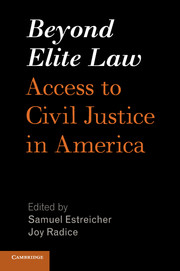Beyond Elite Law
Published online by Cambridge University Press: 05 May 2016
Summary
We are justly proud of the American legal system and the lawyers and judges who make it work. Our system, to the envy of much of the world, takes law seriously, aspires to reduce the gap between the law on the books and the law as lived, and strives to subject all within its remit to the rule of law. And yet, it remains, at its core, a system of elite law largely for the elite.
We are all engaged in elite law, whether as lawyers or academics. Each year, the law schools produce eager, bright graduates ready to provide legal services to a thin layer of the population — either by working for the major law firms that serve corporate America or for NGOs that practice law with an “impact” on important social issues. Some fortunate graduates find such work; others work for overburdened legal services or public defender officers, or hang a shingle, or practice in small firms although they are usually poorly prepared for the clientele they will encounter. Still many others drop out of the legal system entirely — perhaps their legal education will prepare them for a political or business career, or will not be relevant at all.
We hope in this book to spark a conversation that helps move us beyond elite law, to better align existing legal resources with the people who need representation or simply assistance in navigating bureaucracies but are not wealthy enough to access our “Cadillac” legal system and not poor enough to qualify for the limited supply of publicly supported legal aid.
There is a vital debate in the literature, which we explore, as to whether there is indeed a gap between the demand for legal services and the available supply of providers of such services. Survey instruments do not always faithfully capture underlying facts.
- Type
- Chapter
- Information
- Beyond Elite LawAccess to Civil Justice in America, pp. xi - xivPublisher: Cambridge University PressPrint publication year: 2016



